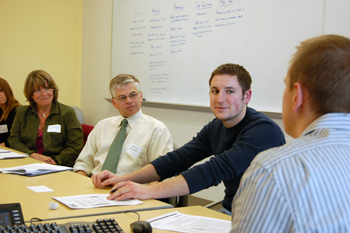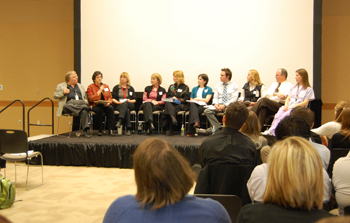UNMC students of all health disciplines stepped outside the classroom recently to get a dose of what it’s like to work with other members of a health care team.
About 500 UNMC students participated in the 3rd Annual UNMC Interprofessional Education Day. The event, sponsored this year by the College of Pharmacy, included students from all UNMC colleges and schools. Students outside Omaha participated via teleconference.
Traditionally, curriculum in health professions colleges has not shown students what it’s like to interact with other health professionals in a health care setting. The challenge has always been to find time in the very demanding curriculums.
 |
From left: UNMC faculty members, Susan Beidler, Ph.D., and Marcel Devetten, M.D., listen to students, Nicolas Trapp and Marcus Anderson during a group exercise. |
 |
Ten members of a UNMC and The Nebraska Medical Center Neonatal Intensive Care Unit team discuss a case study. |
One of the first things the students addressed were stereotypes or notions they may have about practitioners in health disciplines other than their own.
“I think it’s very important to talk about,” said Sarah Bezy, a nursing student. “I think students have a lot of bias with the other disciplines that might cause barriers later. When you work with students early on, it will help to dispel some of the stereotypes.”
Part of the day included a case study presented by a 10-member team from The Nebraska Medical Center’s Neonatal Intensive Care Unit.
The members talked about how they work together as a team, which includes physicians, nurse practitioners, social workers, nutritionists, pharmacists and others.
“Activities such as this will help prepare future health professionals to work together effectively for the best possible patient care,” Dr. Collier said. “It’s like the relationship between a pilot and co-pilot. If they don’t communicate well, then there’s a greater chance there will be a poor outcome.”